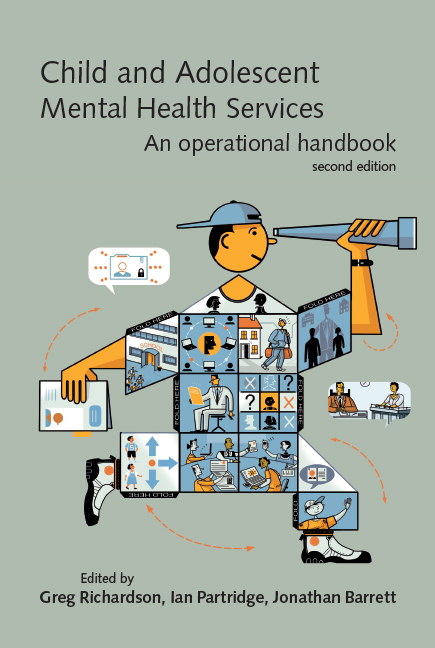Book contents
- Frontmatter
- Contents
- Tables, boxes and figures
- Contributors
- Abbreviations
- Preface
- 1 Introduction
- 2 CAMHS in context
- 3 CAMHS and the law
- 4 Structure, organisation and management of CAMHS
- 5 Evidence-based practice
- 6 Clinical governance
- 7 Education, supervision and workforce development
- 8 Multidisciplinary working
- 9 User and carer participation and advocacy
- 10 A comprehensive CAMHS
- 11 Referral management
- 12 Demand and capacity management
- 13 Strategies for working with Tier 1
- 14 Structuring and managing treatment options
- 15 CAMHS in the emergency department
- 16 Paediatric liaison
- 17 Self-harm
- 18 Learning disability services
- 19 Services for autism-spectrum disorders
- 20 Attentional problems services
- 21 Eating disorder teams
- 22 Bereavement services
- 23 CAMHS for refugees and recent immigrants
- 24 CAMHS and looked-after children
- 25 Drug and alcohol teams
- 26 Parenting risk assessment service
- 27 Court work
- 28 Tier 4 options
- 29 In-patient psychiatric care
- 30 Forensic services
- 31 Neuropsychiatry and neuropsychology services
- 32 Mental health provision for deaf children: study of a low-incidence service provision
- 33 Chief Executives – what do they want and how do they get it?
- Index
20 - Attentional problems services
- Frontmatter
- Contents
- Tables, boxes and figures
- Contributors
- Abbreviations
- Preface
- 1 Introduction
- 2 CAMHS in context
- 3 CAMHS and the law
- 4 Structure, organisation and management of CAMHS
- 5 Evidence-based practice
- 6 Clinical governance
- 7 Education, supervision and workforce development
- 8 Multidisciplinary working
- 9 User and carer participation and advocacy
- 10 A comprehensive CAMHS
- 11 Referral management
- 12 Demand and capacity management
- 13 Strategies for working with Tier 1
- 14 Structuring and managing treatment options
- 15 CAMHS in the emergency department
- 16 Paediatric liaison
- 17 Self-harm
- 18 Learning disability services
- 19 Services for autism-spectrum disorders
- 20 Attentional problems services
- 21 Eating disorder teams
- 22 Bereavement services
- 23 CAMHS for refugees and recent immigrants
- 24 CAMHS and looked-after children
- 25 Drug and alcohol teams
- 26 Parenting risk assessment service
- 27 Court work
- 28 Tier 4 options
- 29 In-patient psychiatric care
- 30 Forensic services
- 31 Neuropsychiatry and neuropsychology services
- 32 Mental health provision for deaf children: study of a low-incidence service provision
- 33 Chief Executives – what do they want and how do they get it?
- Index
Summary
‘No fine work can be done without concentration, and self-sacrifice and toil and doubt.’
Max BeerbohmIntroduction
In the UK, ADHD has been shown to be the most common reason for follow-up appointments to be offered by CAMHS (Meltzer et al, 2000). Child and adolescent mental health services are regularly called upon to assess children who have problems with attention, concentration, distractibility, impulsivity, overactivity, regulatory difficulties, or a combination of these. These difficulties may be part of ADHD or may be symptoms of other disorders that mimic the clinical features of ADHD (Hill & Cameron, 1999). Attention-deficit hyperactivity disorder is a condition where the symptom profile and aetiology are regularly being redefined. Comprehensive guidelines from NICE (National Institute for Health and Clinical Excellence, 2006; National Collaborating Centre for Mental Health, 2008) and a large US study, with its recently published follow-up study (MTA Cooperative Group, 1999; Jensen et al, 2007) have also informed good practice. As additional resources have not often generally been forthcoming to support such good practice, existing services may restructure aspects of their functioning in order to form Tier 3 teams.
One way of rationalising resources effectively is to establish interagency links so that multidisciplinary working is not limited by professional boundaries. Some centres have done just this to meet the needs of children with complex problems, including ADHD complicated by comorbid difficulties (Williams et al, 1999). Where there is no coordinated approach to assessment and intervention for children who present with these difficulties, confusion may arise and contradictory advice may be given by different agencies. Parents and carers need to feel confident that professionals are working with them and with other agencies to provide a comprehensive assessment and treatment package for their children. A Tier 3 team within a CAMHS has the advantage of multidisciplinary working, and this facilitates the development of shared learning and understanding, and the evolution of clear protocols (Voeller, 1991). A specific attentional problems clinic can provide assessment, diagnosis, monitoring and a range of ongoing interventions.
The attentional problems team should ideally include a child psychiatrist, a clinical psychologist and a community psychiatric nurse.
- Type
- Chapter
- Information
- Child and Adolescent Mental Health ServicesAn Operational Handbook, pp. 191 - 199Publisher: Royal College of PsychiatristsFirst published in: 2017



